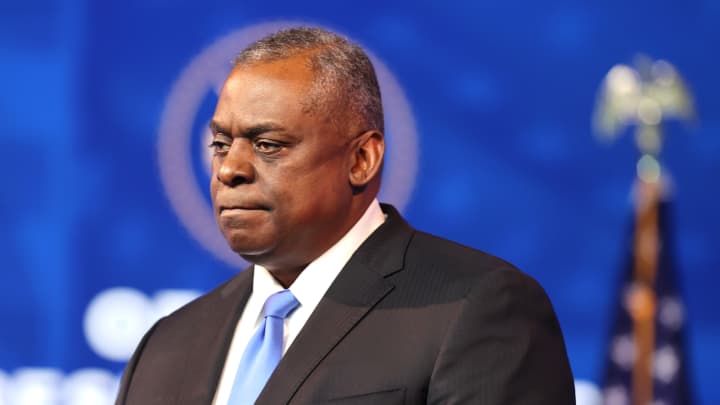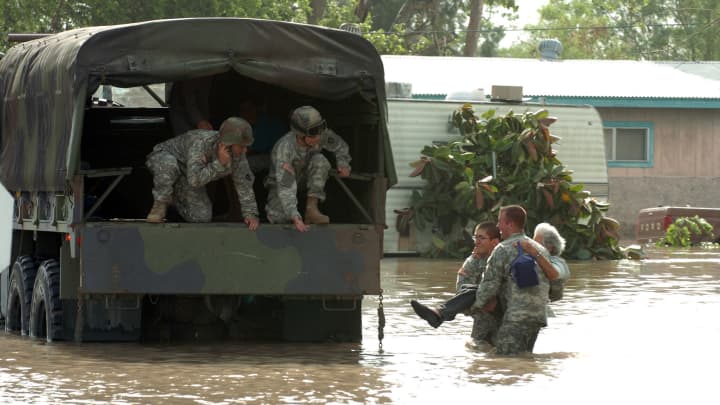PUBLISHED THU, APR 22 2021 3:30 PM EDTUPDATED THU, APR 22 2021 4:15 PM EDT
Amanda Macias@AMANDA_M_MACIAS
KEY POINTS
- Secretary of Defense Lloyd Austin said Thursday the climate crisis is making it more difficult for the military to defend the U.S. and its allies.
- Austin said the nation's 18 intelligence agencies are slated to produce a report focused on the security implications of climate change.
- He spoke at a summit with world leaders focused on climate change, where President Joe Biden pledge to cut emissions by 50% to 52% by 2030.

U.S. Army (retired) General Lloyd Austin speaks after being formally nominated to be Secretary of the Department of Defense by U.S. President-elect Joe Biden at the Queen Theatre on December 09, 2020 in Wilmington, Delaware.
Chip Somodevilla | Getty Images
WASHINGTON — Secretary of Defense Lloyd Austin on Thursday described the climate crisis as one of the nation's existential threats with the potential to profoundly destabilize global security.
"From coast to coast and across the world, the climate crisis has caused substantial damage and put people in danger, making it more difficult for us to carry out our mission of defending the United States and our allies," Austin said in an address at a summit with world leaders focused on climate change.
"As the Arctic melts, competition for resources and influence in the region increases. Closer to the equator, rising temperatures and more frequent and intense extreme weather events in Africa and Central America threaten millions with drought, hunger and displacement," the Pentagon chief added.
President Joe Biden kicked off the virtual summit, which falls on the fifth anniversary of the Paris Agreement signing and Earth Day, with a pledge to cut emissions by 50% to 52% by 2030.
The new target more than doubles the Obama administration's prior commitment under the 2015 Paris climate agreement. Former President Donald Trump withdrew the United States from the accords in 2019.
"I welcome President Biden's leadership on tackling climate change," NATO Secretary-General Jens Stoltenberg said in his opening remarks at the summit.
"Global warming is making the world more dangerous. It has a serious impact on our security, so it matters for NATO," he said, adding that NATO members would be stepping up efforts to address the climate crisis.

Texas National Guard Pvt. Mark Rivera of Co. A, 72nd Infantry Brigade, and Pvt. 1st Class Joseph Davora, Co. A, 1-41 Infantry Regiment, carry a woman stranded by flood waters to a waiting truck, where Pvt. John Paul Borrego and Pvt. 1st Class Christopher Culbelier, wait.
Sgt. Jennifer Atkinson | U.S. Army
In his remarks, Austin gave a few examples of extreme weather caused by climate change that directly impacted the U.S. military and its installations.
In 2018, Hurricane Michael inflicted 'catastrophic' damage to Tyndall Air Force Base after ripping through the Florida Panhandle. Austin said the destruction to the base, which is home to the nation's 325th Fighter Wing, cost billions of dollars.
In 2019, severe flooding of the Missouri River damaged more than 130 buildings at Offutt Air Force Base near Omaha, Nebraska. The installation, home to U.S. Strategic Command and the 55th Wing, has required hundreds of millions of dollars for reconstruction efforts.
"Wildfires in California have threatened other military installations, forcing repeated evacuations. Typhoons in Guam most commonly occur from June to December, but in February 2019, Typhoon Wutip forced us to pause exercises with our Australian and Japanese allies," Austin explained.
Austin said the nation's 18 intelligence agencies are slated to produce a report focused on the security implications of climate change.
No comments:
Post a Comment